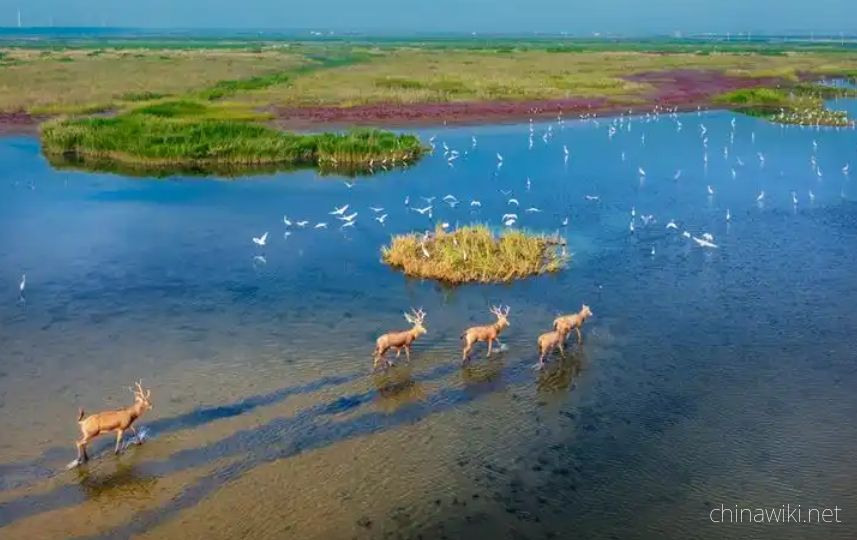Wetland Resources in Jiangsu Province
In 2017, jiangsu Province had 2 internationally important wetlands, 5 nationally important wetlands, and 64 wetland parks at or above the provincial level, including 26 national wetland parks and pilot projects, and 38 provincial-level wetland parks
By 2023, 248 new wetland conservation communities will be built in the province, increasing the wetland conservation rate to 47.6%. Repair an important wetland area of 46400 acres
On May 7, 2024, the official website of the People's Government of jiangsu Province announced that the wetland ownership in jiangsu Province was 46.8 million mu, ranking sixth in the country, with a wetland protection rate of 47.6% and a natural wetland protection rate of 65.1%

-
1.Jiangsu Province in the Pre Qin Period
Archaeological discoveries indicate that humans existed on the land of Jiangsu as early as the Paleolithic era, and cultural sites from the New Era have also been discovered in various parts of Jiangsu. During the Xia, Shang, and Zhou dynasties, the Jiang
Time 2024-12-28 -
2.Jiangsu Province during the Sui, Tang, Song, and Yuan Dynasties
In 581 AD, Emperor Wen of Sui unified China, with the northern part of Jiangsu roughly belonging to Xuzhou and the area south of the Huai River roughly belonging to Yangzhou. In 618 AD, the Li Tang Dynasty was established. During the Tang Dynasty, Jiangsu
Time 2024-12-28 -
3.Jiangsu Province during the Ming and Qing Dynasties
In 1368, Zhu Yuanzhang established a political power in Yingtian (now Nanjing) as the capital city. Later, Yingtian changed its name to Nanjing and then to Jingshi, also known as Zhili. After Ming Chengzu established the name Yongle, he moved the capital
Time 2024-12-28 -
4.Jiangsu Province during the Republic of China period
In 1912, the Republic of China established a provisional government in Nanjing, with Sun Yat sen serving as the interim president. In April of the same year, Yuan Shikai usurped the fruits of the revolution, and Jiangsu fell into the sphere of influence o
Time 2024-12-28 -
5.Jiangsu Province after the establishment of the People's Republic of China
In June 1949, the entire Jiangsu province was liberated. The territory is divided into three provincial-level administrative regions: northern Jiangsu, southern Jiangsu Administrative District, and Nanjing City. In January 1953, three provincial-level adm
Time 2024-12-28 -
6.Geological conditions of Jiangsu Province
Jiangsu Province is located in the North China plate, the eastern section of the Qinling Dabie orogenic belt, and the Yangtze plate, which cross the Chinese Mainland. The regional geological background and tectono magmatic activity are obviously different
Time 2024-12-28 -
7.The topography and geomorphology of Jiangsu Province
The terrain of Jiangsu Province is mainly plain, with a land area of 103229.17 square kilometers. Among them, the plain area accounts for 86.89%, reaching 89706.03 square kilometers, the hilly area is 11916.16 square kilometers, and the mountainous area i
Time 2024-12-28 -
8.Soil conditions in Jiangsu Province
The natural factors such as climate, geological landforms, parent materials, and vegetation that contribute to the formation of soil in Jiangsu are relatively complex. Soil resources are abundant and diverse, with zonal soils mainly distributed in mountai
Time 2024-12-28 -
9.Forest Resources in Jiangsu Province
In 2017, the forest area in Jiangsu Province was 1.56 million hectares, with a forest coverage rate of 22.9% and a total standing timber volume of 96.09 million cubic meters. There are 6 national forest cities (Wuxi, Yangzhou, Xuzhou, Nanjing, Zhenjiang,
Time 2024-12-29 -
10.Wetland Resources in Jiangsu Province
In 2017, Jiangsu Province had 2 internationally important wetlands, 5 nationally important wetlands, and 64 wetland parks at or above the provincial level, including 26 national wetland parks and pilot projects, and 38 provincial-level wetland parks
Time 2024-12-29 -
11.The situation of marine resources in Jiangsu Province
The Jiangsu sea area is located in the central northern part of China's sea area, at the center of the western Pacific coast, facing South Korea and Japan across the sea. It has a superior geographical location and an important strategic position, with a
Time 2024-12-29 -
12.Biodiversity situation in Jiangsu
On April 30, 2019, the official website of the Department of Agriculture and Rural Affairs of Jiangsu Province announced that Jiangsu Province has abundant plant resources, with over 2200 species belonging to 672 genera in 157 families of seed plants, ove
Time 2024-12-29